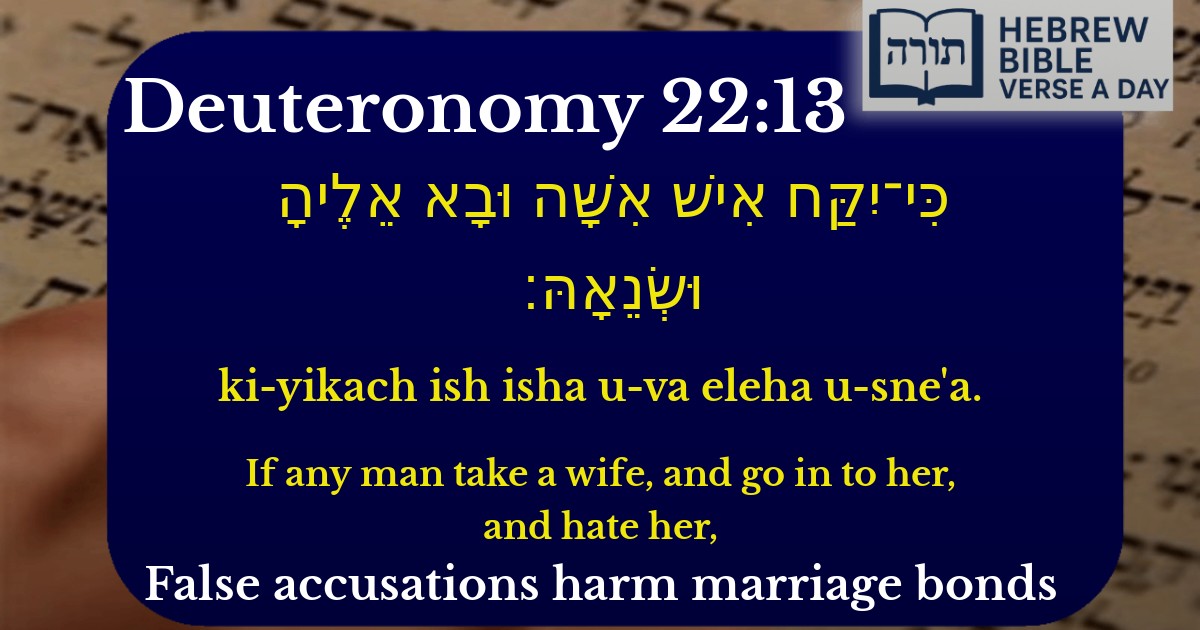Frequently Asked Questions
Q: What does Deuteronomy 22:13 mean in simple terms?
A: This verse discusses a situation where a man marries a woman, consummates the marriage, and then comes to dislike her. It introduces a legal scenario about marital issues, which the Torah later addresses with specific laws (Deuteronomy 22:13-19). Rashi explains that this refers to a husband making false accusations against his wife's purity after marriage.
Q: Why is this verse about a man hating his wife important in Judaism?
A: This verse is important because it teaches about the seriousness of marriage and the consequences of making false accusations. The Talmud (Ketubot 46a) discusses the laws derived from this, emphasizing the need for honesty in marital relationships and protecting a woman's reputation. The Torah sets strict penalties for a husband who falsely slanders his wife.
Q: What can we learn from Deuteronomy 22:13 about marriage in Judaism?
A: We learn that marriage is a sacred bond that must be treated with respect. The Torah warns against hasty judgments or false claims in marriage. Rambam (Hilchot Ishut 24:19) explains that this law teaches the importance of trust and proper conduct between spouses, as well as the severe consequences for violating these principles.
Q: How does this verse apply to relationships today?
A: While the specific legal case may not apply directly today, the principle of maintaining honesty and avoiding baseless hatred in marriage remains timeless. Jewish tradition (based on Talmudic interpretation) teaches that spouses must work on their relationship with patience and integrity, avoiding harmful speech or false accusations that could damage their bond.
Q: What happens next in the Torah after this verse about the man hating his wife?
A: The following verses (Deuteronomy 22:14-19) describe the legal process when a husband falsely accuses his wife of not being a virgin at marriage. If proven false, the husband is punished and must pay a fine to the woman's father. The Midrash (Sifrei Devarim) explains this shows the Torah's protection of women's dignity and the seriousness of making false marital accusations.


Context in Torah
The verse (Devarim 22:13) introduces the case of a man who marries a woman, consummates the marriage, and subsequently comes to hate her. This scenario is part of a larger discussion in the Torah about marital disputes and the laws concerning slander against a new wife.
Rashi's Explanation
Rashi explains that the term "וּשְׂנֵאָהּ" (and hate her) refers to a situation where the husband fabricates false accusations against his wife, claiming she was not a virgin at the time of marriage. This hatred leads him to slander her publicly. Rashi emphasizes that the Torah is addressing a malicious intent, not merely an emotional dislike.
Ibn Ezra's Insight
Ibn Ezra notes that the phrase "כִּי־יִקַּח אִישׁ אִשָּׁה" (If any man take a wife) implies a legitimate marriage (kiddushin), and the subsequent hatred is a betrayal of the marital covenant. He highlights that the Torah’s concern is with the ethical and legal consequences of such behavior.
Halachic Implications (Rambam)
Rambam (Hilchos Ishus 24:15) discusses the severity of falsely accusing one’s wife. If the husband’s claims are proven false, he is:
Midrashic Perspective
The Midrash (Sifrei Devarim 237) connects this verse to the broader theme of shalom bayis (marital harmony). It teaches that hatred in marriage is a serious breach of trust, and the Torah provides legal measures to protect the wronged party—especially the wife, who is vulnerable to defamation.
Moral Lesson
This verse underscores the Torah’s emphasis on honesty and kindness in marital relationships. Hatred, especially when expressed through false accusations, is condemned as a destructive force. The halachic response reinforces the value of justice and the protection of individual dignity.